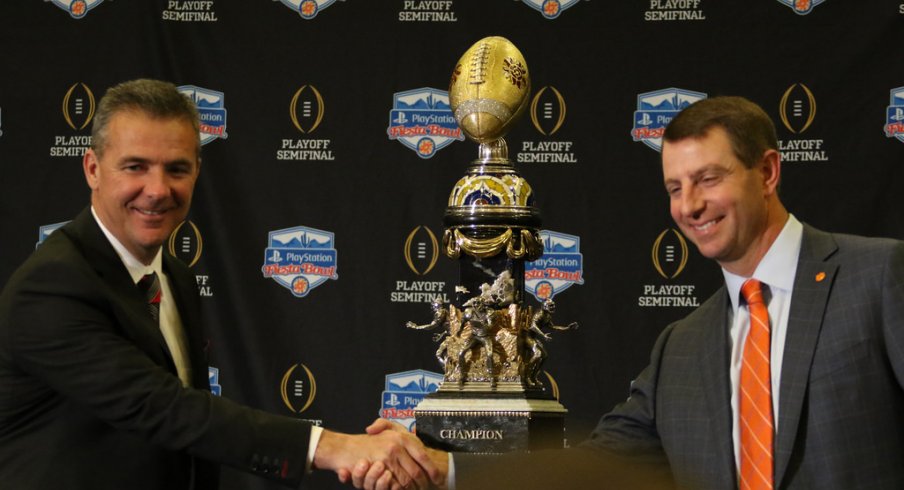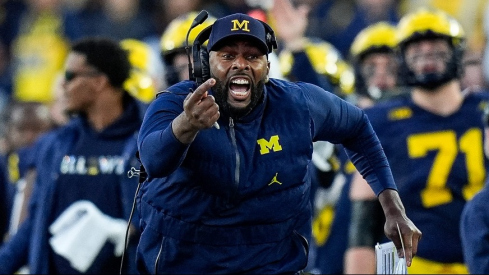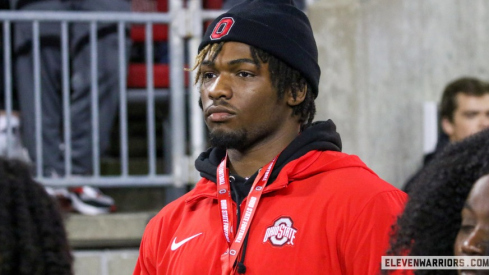One of the most valued character traits of Urban Meyer, especially among the media, is his general frankness about himself, his staff, and his team. Whereas Jim Tressel was a riddle wrapped in a mystery inside a sweatervest, Urban Meyer has a reputation for mostly wearing his heart on his sleeve when it comes to an honest assessment about how he feels his team is performing.
This was an especially welcome change to us, the newspeople, because instead of having to become experts at reading the tea leaves that The Senator scattered around his podium, Meyer will often just say "WE SUCKED" and we can go "welp, print it!"
It's nice. But that also makes it particularly annoying when he blows smoke up our collective asses, because now the illusion of maybe him believing for a half second that Tulsa is a formidable foe is completely gone. He knows it's crap, we know it's crap, you know it's crap, and by inference we can probably assume that the players know it's crap. And yet...
As part of Sports Illustrated’s preseason Top 25, we set out to learn as much as we could about the strengths and weaknesses of the nation’s best teams heading into 2017. Who better to ask than the opposing coaches who spend all year scheming to knock these teams off?
Well, almost anybody, really. The mutual admiration society in college football is in session even when these dorks are anonymous.
And to be fair, yeah, a lot of these teams are very good. A coach is allowed to say that Alabama doesn't have a lot of weaknesses or that J.T. Barrett can play some football. But what's weird is that in lieu of saying anything at all negative, football coaches under whatever the exact opposite of what duress is will still go out of their way to wax poetic and posit demonstrably false statements about their (potential) rivals for the national championship crown at the end of the year.
Here are a few examples of what I'm talking about:
Now [Oklahoma State is] moving to a three-man front. Most teams have a weakness somewhere on the defensive line. They really don’t.
Really, Anonymous College Head Coach? None? Because for the record, Oklahoma State was 76th in opponent yards per carry last year, allowing 4.59 ypc, and 82nd in yards allowed per game with over 193. Yes, they did an okay job of getting to the quarterback last season and creating tackles for loss, but allowing three teams to torch you for well over 300 yards on the ground doesn't exactly scream "no weaknesses" to me.
Or how about the defending champs?
The team will lose [quarterback] Deshaun Watson [first-round pick of the Texans], and whether it’s this year or next year, someone else almost as good will come up through. [Junior] Kelly Bryant may start this year, but the younger guys [four-star recruit Zerrick Cooper and five-star Hunter Johnson] will put the pressure on.
Kelly Bryant, the guy with the inside track on winning the starting job, has 18 pass attempts in two years of college football. Maybe he'll be great! But assuming greatness is not generally what coaches are expected to do.
There was a huge difference in Miami’s discipline last season. The year before, things got a little bit out of hand with the penalties. Last year they saw fewer flags—and they played much more physical.
This is technically true; Miami in 2015 was the most penalized team in the entire country, and in 2016 they were not, and subsequently improved their defense. It is also true that in 2016 they were the 107th most penalized team in the entire country.
And so on. These aren't huge failings of judgement, just small, stupid white lies that really serve no purpose except to help generate a pretty limp and bland preseason article that demonstrates none of the insight that's being advertised when the headline shouts ANONYMOUS RIVAL COACHES REVEAL SCOUTING REPORTS!!!
It's not impossible to write an effective article of this nature. Athlon Sports did a series of anonymous coach scouting reports for each of the Power Five conferences, and the article on the Big Ten especially doesn't skimp too much on the sass, especially about the bottom tier of the conference. Maybe the lower profile of Athlon gave coaches the freedom to really speak what's on their mind, but it's also possible that Athlon was asking the right questions.
Which leads us back to Urban Meyer. Inside of Meyer is a person who I know is fighting with every fibre of his being to stay as on-message as possible, even when his brain and his heart and whatever other organs of his body he thinks with are dying to tell the truth about his upcoming garbage opponents.
I'm skeptical that Urban Meyer really thought that the matchup against Tulsa, a game that the Buckeyes would go on to win by, uh, 45 points, would be a "chess match." I do not believe that he was worried about Bowling Green's tempo. And if he really expected the Rutgers game to be "very serious stuff" because Chris Ash had some inkling of Ohio State's defensive signals, then he is dumb. Because it wasn't. Urban's squad won 58-0.
The whole song and dance routine of building up your future opponents (even anonymously) is such a weird part of the fabric of sports that it'll probably never go away, but to me it also represents the larger effort of coaches to completely and utterly control the narrative surrounding their team, even to the point of helping other coaches do the same.
I know exactly how stupid that sounds, but understand that the ultimate goal of a college football coach is to convince others that they have some kind of special insight into a team when they absolutely do not. Hence various suspensions for "violations of team rules," hence banning the media from Twitter during a presser, hence closing practices and players to the media, etc.
Our job as fans and reporters of information who pretend not to be fans is to make sure that instead of fawning over coaches and players when they finally are subjected to the slings and arrows of legitimate questioning during press conferences and call-in shows, we ask prescient and important questions that can't be handwaved away with a vague statement about progress and how the other team has a lot of senior leadership and blah blah blah whatever. It won't make coaches happy, but given that anything beyond "looked good out there, huh?" can often accomplish that feat, I'm not going to lose sleep over it.
Football isn't nearly as simple or narrative-driven as some coaches and administrators (and sometimes even the press!) would like you to believe that it is. It's a complicated, interesting game, and coaches patting each other on the back every week does nothing but diminish it.
Ohio State is lucky in that we have a head coach who seems to understand that about 75% of the time. The other 25% is our responsibility.


